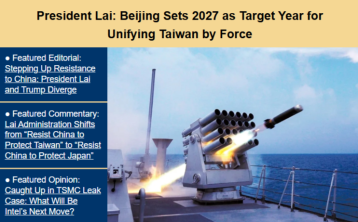
Stepping Up Resistance to China: President Lai and Trump Diverge
An opinion piece by President Lai Ching-te was recently published in The Washington Post, declaring that Taiwan will significantly increase its defense budget, promote all-people defense, strengthen asymmetric warfare, and explicitly position Taiwan on the front line of resisting Beijing's hegemony. In terms of domestic political effect, the op-ed does allow supporters to see that "we are brave," while conveying to the international community Taiwan's posture of "never yielding."
...read more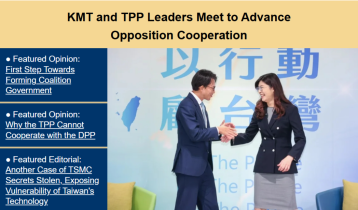
First Step Towards Forming Coalition Government
The meeting between Chairwoman Cheng Li-wun of the Kuomintang (KMT) and Chairman Huang Kuo-chang of the Taiwan People's Party (TPP) on November 19 became the most closely watched political development. Their dialogue is not merely a political maneuver; it also reflects changes in the new political structure and could mark the starting point for Taiwan's first move toward a “coalition government.”
...read more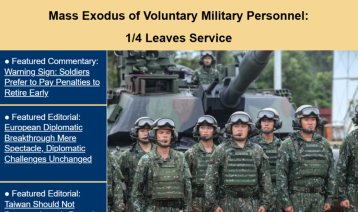
Warning Sign: Soldiers Prefer to Pay Penalties to Retire Early
The Democratic Progressive Party (DPP) administration has invested substantial time and effort discussing how to strengthen Taiwan’s defense capabilities. Yet, it has offered very little discourse on how to prevent war. In such a social climate, who would still be willing to stay in the military? Young people’s indifference toward national defense is, in fact, rooted in their distrust of war.
...read more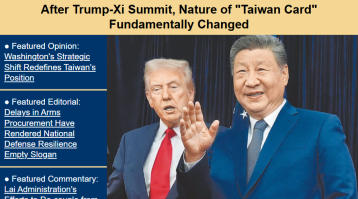
Washington's Strategic Shift Redefines Taiwan's Position
The ripples from the meeting between President Donald Trump of the United States and Chinese President Xi Jinping in Busan, South Korea, continue to spread—especially regarding the unexpected absence of any discussion on the “Taiwan issue.” Recently, in a CBS 60 Minutes interview, Mr. Trump was asked directly: if China attacks Taiwan, “Would you order U.S. troops to defend Taiwan?”
...read more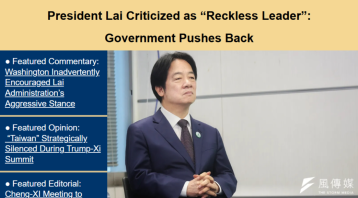
Washington Inadvertently Encouraged Lai Administration's Aggressive Stance
Washington think tanks have recently turned unfavorable toward Taiwan. TIME magazine described President Lai Ching-te as “reckless,” while Foreign Affairs published an article reviewing how President Lai’s “anti-China” rhetoric since taking office has heightened cross-strait tensions. Yet the piece that struck Taiwan’s public sentiment most deeply was The Economist’s “What Is Taiwan’s Plan B?”, a reality that may be the last thing the Lai administration or the Democratic Progressive Party (DPP) wishes to confront.
...read more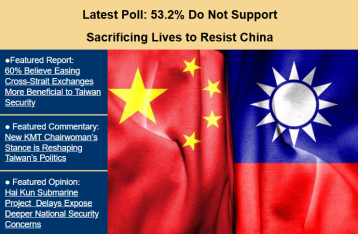
60% Believe Easing Cross-Strait Exchanges More Beneficial to Taiwan Security
The latest October 23 poll released by My Formosa E-Newsletter posed questions on cross-strait issue., When asked, “Which of the following approaches do you think can better maintain Taiwan’s security and avoid a cross-strait war?”, 58.3 percent said “resuming cross-strait government negotiations and relaxing civil exchanges,” while 28.2 percent chose “increasing the national defense budget annually to purchase more arms.”
...read more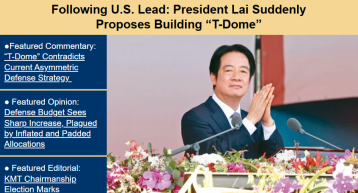
"T-Dome" Contradicts Current Asymmetric Defense Strategy
In his National Day address, President Lai Ching-te highlighted a pledge to propose a special defense budget to accelerate construction of a national air-defense system dubbed the “Taiwan Shield” (T-Dome). The announcement—one of the few notable points in an otherwise detail-heavy speech—dominated headlines the following day.
...read more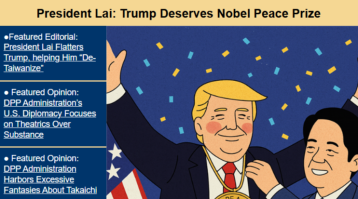
President Lai Flatters Trump, helping Him “De-Taiwanize”
On the eve of National Day, President Lai Ching‑te gave an interview to an American conservative radio program, warning that if Taiwan were annexed, then it would directly harm U.S. interests. He added that if President Donald Trump of the United States could persuade Chinese President Xi Jinping to abandon the use of force against Taiwan, he would deserve the Nobel Peace Prize. A White House spokesperson later responded that “Trump deserves the prize,” prompting cheers from supporters of President Lai’s ruling party, who viewed it as a symbolic alignment between President Lai and Mr. Trump. Yet, the White House avoided any mention of Taiwan—suggesting that the praise was more about flattering Mr. Trump than endorsing President Lai’s remarks.
...read more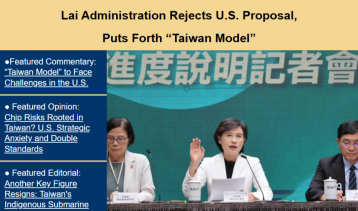
"Taiwan Model" to Face Challenges in the U.S.
Vice Premier Cheng Li-chun has put forward the idea of a “Taiwan model,” aiming to export Taiwan’s decades of experience in developing science parks to the United States, assisting Washington in building industrial clusters and creating “quasi-science parks.” It looks like sending a “Team Taiwan” to play an “American Cup.” But Taiwan’s science parks are the institutional product of four decades of accumulation. Can such a model really be transplanted and replicated abroad? Could it even serve as a bargaining chip in negotiating tariff concessions with the United States?
...read more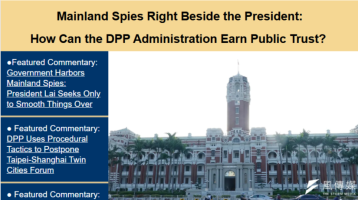
Government Harbors Mainland Spies: President Lai Seeks Only to Smooth Things Over
Wu Shang-yu, former staff consultant at the Office of the President, and Ho Jen-chieh, aide to then-Minister of Foreign Affairs Joseph Wu, were among those implicated in a mainland Chinese espionage case. In the first trial, they were sentenced to prison terms ranging from four to ten years. The ruling Democratic Progressive Party (DPP) has long accused opposition parties of being “pro-China,” yet it has now become a breeding ground for mainland Chinese spies. To date, neither the Office of the President, the Executive Yuan, nor the DPP has offered an official explanation or public apology for the spy case, a double standard that the public finds hard to accept.
...read more